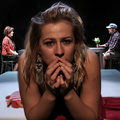Áron Tamási's Ancient Solace
Guest Performance at the National
Supposedly the first play by accomplished Hungarian author Áron Tamási, Ősvigasztalás (Ancient Solace) is an odd drama – far stranger than his popular Énekes madár (Songbird) or Vitéz Lélek (Valiant Soul), which can be seen now at the Nemzeti Színház. This was amply demonstrated by the guest ensemble from Békéscsaba’s Jókai Színház. They recently performed their production of Ancient Solace at the National Theatre of Budapest. The show premiered in Békéscsaba on September 8, 2017.
In essence, the play is a ritual, sometimes a liturgy. As contemporary critic Andrea Tompa wrote in her introduction to Bernard Adams’s translation of Énekes madár (Songbird in Visegrad Drama II: Escape. Budapest: Hungarian Theatre Museum and Institute, 2004), “[In Ancient Solace] the word itself is the event, as in a pagan ceremony; utterance is action.” Director Attila Berés appears to have the same idea. The audience was escorted into the space by two masked men beating drums. Onstage, they were joined by violin, bass, and cimbalom while the remaining masked cast members performed a circular dance within the geometric set, also reminiscent of a nave dominated by a large green grassy crucifix.
This performance has a directorial flavor different from most productions now in the capital, reminiscent of Romanian directors or Hungarian directors in Transylvania (for example, László Bocsárdi) who make more liberal use of masks, live music, dance, and gesture. Also, they tend to block their actors more strictly according to an overall vision. In the present case, it effectively brings out the ritualistic nature of the piece, but it also presents challenges for the performers. Some actors are inhibited by the ceremonial form. Others use it as an occasion to overact wildly. (The worst perpetrator was Attila Gulyás in the role of Town Clerk.)
Then again, the play does not aid matters. Sometimes, it veers into action-drama territory, like when the protagonist is brought to trial for suspected murder on account of his hasty cremation of his older brother’s dead body. In Tamási’s worldview, this represents the artificial modern world’s interference in the life of the Székely, an ethnic Hungarian group who are more in touch with nature. At this point, the drama becomes a black-and-white struggle between the forces of good and evil.
The best at walking this line between pastoral realism and poetic ritual is Ferenc Katkó, who is fortunately cast as the jealous suitor of Julianna, a comely orphan girl played by Melinda Liszi. She is called upon to cry at least once in all her scenes. Suffice to say, she acquits herself well and contributes evocative vocals during the scene changes. Frigyes Kovács is miscast as the protagonist Ádám Csorja. Despite his beautiful speaking voice, he is too old to be a valid rival for Julianna’s affections.
In essence, the production achieves much from very little. The set is attractive, and there are exciting fire effects. Symbolic use is made of flowers, petals, milk, ash, wine, and blood, reinforcing the ritual nature of the play. The boundary between actors, musicians, and chorus often blurs, lending it an oratorio effect. On the other hand, the conclusion seems top-heavy with drama (as in Áron Tamasi’s Vitéz lélek), and the director throws in a rape that is both gratuitous and physically impossible.
At one point, three actors (who function like chorus members, assuming a variety of roles) trade jokes about the Székely. This goes to the very heart of the dilemma. The Székely people in this play are the heroes. Their traditions represent the ultimate good. Thus, the temptation is strong to portray them stereotypically.
Áron Tamási was born in the Székely region of Transylvania (in Farkaslaka), and he drew inspiration from its unique culture throughout his writing career. All too often, his plays fall prey to ethnic stereotyping, of the sort which I roundly criticized in my review of A medve nem játék! (Bears are No Joke!) at Turay Ida Színház. The costumes here have a traditional flavor, but they are not the gaudily embroidered Easter-parade garments that producers often use to indicate “Székely.” Although the time period is fluid and unspecified, these are outfits that people would conceivably wear in the course of their daily lives.
All in all, this is a less than perfect production of a less than perfect play, but it is an exciting benchmark. Perhaps it will inspire others to take a shot at Ancient Solace and to envision Áron Tamási’s works in a fresh way without rehashing the worn-out clichés.
A bejegyzés trackback címe:
Kommentek:
A hozzászólások a vonatkozó jogszabályok értelmében felhasználói tartalomnak minősülnek, értük a szolgáltatás technikai üzemeltetője semmilyen felelősséget nem vállal, azokat nem ellenőrzi. Kifogás esetén forduljon a blog szerkesztőjéhez. Részletek a Felhasználási feltételekben és az adatvédelmi tájékoztatóban.





